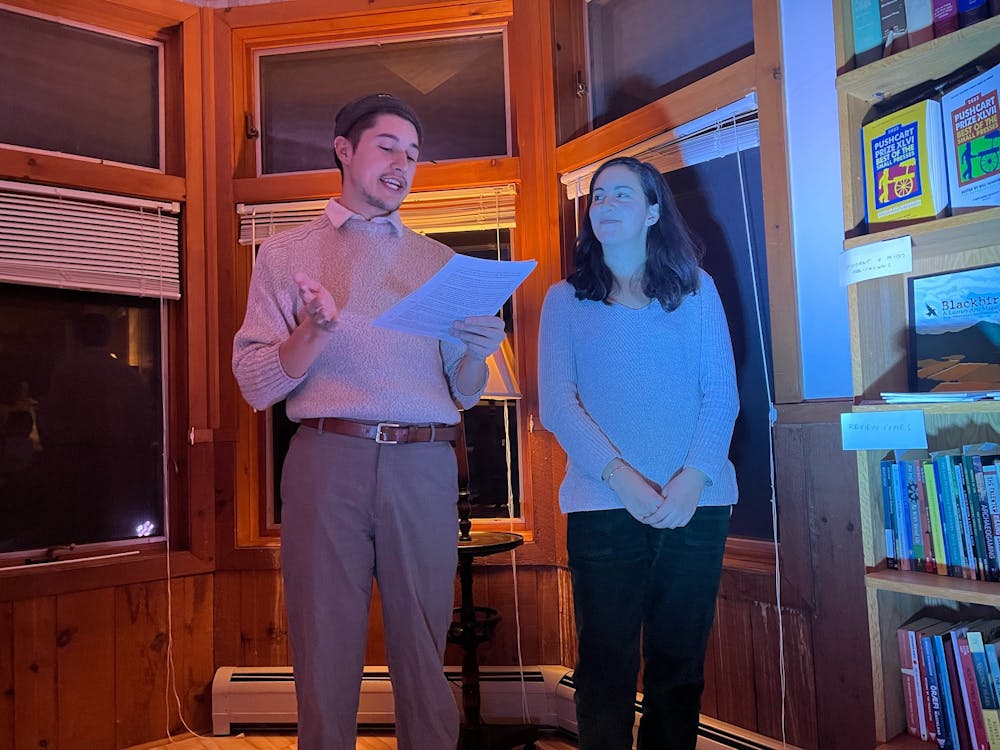The night of Jan. 22 was a bleak one for Middlebury College, the sun setting early on a foggy and eerie campus. Despite the rather grim atmosphere, the main room of the New England Review headquarters on College Street was packed to the brim with roughly 40 students, sitting on extra chairs borrowed from the Bread Loaf Writers Conference building in anticipation of the crowd the event organizers hoped to draw.
In a dark time for the college community in the aftermath of the death of a Middlebury student over winter break, these students gathered together to find light at Student Poetry Night, a collaborative effort between co-organizers Arthur Martins ’23.5 and Lucia Snyderman ’23.5 and the staff of the New England Review.
Student Poetry Night was inspired by past partnerships between the New England Review and the college, specifically NER Out Loud. A collaboration between the New England Review and Oratory Now, NER Out Loud returned to campus last spring following a three-year pandemic hiatus with students reading selections from works published by the literary journal.
Last week’s poetry night was an extrapolation of the smaller reception at the end of Out Loud, called “S’More Readings,” where students were given the chance to read original poetry. Snyderman explained how an event like this was crucial after the Covid-19 pandemic tested the writing community’s resolve.
“We felt that interest in clubs declined during and after the pandemic, and we were happy to see so many people come and utilize the space and be comfortable with themselves,” Snyderman told The Campus. “It was inspiring to see people open up after a pandemic and recent tragic events on campus and in the world.”
The importance of having an intentional forum for creative writing in the current moment was made evident by the vulnerable themes put on display by student performers from the beginning of the poetry reading. Alex Nichols ’25 started the readings off with a poem called “Jungle,” which addressed the concept of salvation and how nirvana cannot be achieved by the living, but will only be understood in death.
“I feel like I’ve died ever since I was born. And I don’t mean the death that brings the end, no, I mean the death that creeps around you like an ugly shadow, pulling you back with heavy weight,” Nichols wrote in the poem.
Interestingly, this poem was not originally a response to the campus climate. It was written before the fall semester, though Nichols said the piece must now be read in a different light in reflection of recent campus and world events.
“My motivation for that piece was to try to appeal towards commonly held beliefs about interpersonal relationships, belief systems and peace, and to challenge them,” he explained.
Others also wrote and read aloud pieces about heavy topics but in different modalities. In an untitled essay addressed to a family member, Caroline Jiao ’24 recounted parental worries about having a child at a college that has experienced three deaths in three months while also reflecting on depression and other themes.
“It was so intimate and well-observed,” said Emma Johnson ’23.5 of Jiao’s work.
The audience continued to enthusiastically receive those who shared their words, especially through discussion of themes such as identity, mental health and politics, that required both a vulnerable audience and poet. Brooklin Dillard ‘27 had written poetry and shared it with friends before, but this was her first time sharing her work publicly. She explained feeling nervous but also proud of reading her story, which intimated the feelings of being in college for the first time and the hope in finding joy within oneself, anywhere one goes.
“My poem was about home as a feeling, not a place, and especially about missing home because of my first semester in college,” Dillard said.
For some audience members, watching other students read their writing was so inspiring that they became moved to present their own work. One such spectator was Sam Wemmer ’26, who, after listening to inspiring poetry and feeling more comfortable in the space, decided to share an original work.
“The spirit moved me, as the Quakers say, and I decided to read a very short story I had written for my J-Term course based on a story my father had told me about when he accidentally shot a robin when he was a child,” Wemmer said.
If Martins and Snyderman’s overarching goal was to cultivate a space where students could open up onstage about both light and serious themes and connect over common poetic interests, this event was a resounding success. Even after the two hours of reading was over, students lingered to meet those who had read or been listening to the poetry.
“For me, it’s a sign that the creative writing scene at the college remains strong, if only lacking spaces to bloom,” Martins said.




